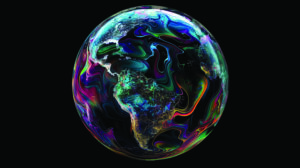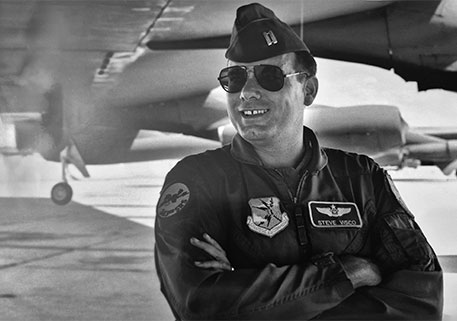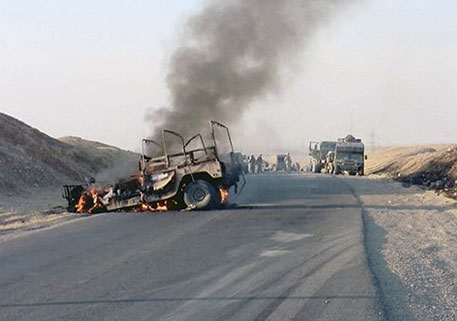
Blake was in turmoil. He was constantly angry and anxious, but his temper was particularly sharp around his son.
“He was absolutely beautiful and perfect, and I’d get angry that I couldn’t help him,” said Blake, a Marine veteran who asked DAV not to print his real name due to his civilian career.
After welcoming another child, his anger returned with a much shorter fuse. That’s when Blake began researching alternative therapies.
He began with meditation, yoga and exercise to help balance out his feelings. Then Blake saw an advertisement online from an organization called Heroic Hearts.
“I went to the website and found they do retreats for veterans, both ayahuasca and psilocybin,” he said.
A recent explosion of interest has encircled psychedelics and their potential medical use. Psychoactive drugs like psilocybin—the active compound in psychedelic mushrooms—LSD and MDMA have long been Schedule 1 drugs but are now being investigated for their potential healing properties, particularly for post-traumatic stress disorder, depression and other mental health conditions affecting veterans.
Several studies have linked these compounds with positive results, causing an increase in individuals seeking them to treat their health issues.
“When we see the issue or the friction point, we’re not just going to sit there and provide covering fire,” Blake said. “We’re going to be aggressive, and that’s what I think psychedelic therapy is all about.”
He attended a Heroic Hearts retreat in Jamaica. He is among more than 1,000 veterans and spouses who have reduced or eliminated their PTSD symptoms through Heroic Hearts, according to the organization’s website. Retreats take place in Peru and Mexico, in addition to Jamaica, all countries where psychedelic compounds are permitted.

“My nonprofit shouldn’t exist,” said Jesse Gould, a former Army Ranger who served in Afghanistan and the founder of Heroic Hearts. “There’s something massively wrong with the system that people [are] Google searching for lifesaving care and abandoning free health care through the VA to go to other countries.”
However, that care doesn’t come without potential risks. Psychedelic treatment centers outside the U.S. are not required to adhere to the strict, rigorous guidelines that American medical providers are.
“Because it is in this world where there’s minimal or no regulations, people are sort of on their own to figure that out,” Matthew Johnson, a Johns Hopkins psychedelics researcher, told Salon.
Gould is clear that Heroic Hearts is not administering psychedelic substances but connecting veterans with established psychedelic retreat centers that have historical, Indigenous traditions.
“It just indicates how flawed the system is,” he added.
The system hadn’t worked for Blake. He left military service after three combat deployments and fell quickly into drinking and self-medicating. He dropped out of college after three days.
“I sought help with the VA, I sought some outside counseling, but it was never anything that really resonated with me,” Blake said. “I look back, and there’s all these things; it’s like I saw some of the trauma, but I didn’t acknowledge it.”
By the time he booked the trip to Jamaica, Blake was desperate for healing. His psychedelic experience began with breathing exercises and meditation while blindfolded. After ingesting the dose of psilocybin, seemingly never-ending colorful patterns appeared. The visuals were intense, but as the trip proceeded, he removed his blindfold and began thinking of his family.
He felt a chain and imagined himself like the Greek titan Atlas, who crouches underneath a globe that is balanced on his shoulders.
“I felt like I can’t let go, and then all of a sudden, there was just a moment of the weight released, and it was free,” Blake said.
It was a meaningful experience completely different from what he thought, although any long-lasting positive effects remain unknown.
Psilocybin has been designated a “breakthrough therapy” by the Food and Drug Administration. This priority review is granted if preliminary clinical trials indicate safety and effectiveness for major depressive disorder.
Challenges remain not only for would-be patients but also for researchers and companies looking to market psychedelics. In August, MDMA was rejected by the FDA, which had previously granted the chemical as a breakthrough for PTSD. The decision was the first time the FDA considered a Schedule 1 psychedelic for medical use. It would have been the first new PTSD medication in more than 20 years and would have allowed the Department of Veterans Affairs to provide access to a treatment currently out of reach within the United States.
Other studies have supported the benefits of psychedelic use, particularly when paired with a psychological intervention. These compounds can catapult consciousness into an altered state, making research less clear-cut than other medications.
Offering psychedelics as treatment options remains highly restricted or prohibited in many places in the United States. However, laws and policies are evolving, and Heroic Hearts legally conducted its first retreat in the United States earlier this year.
DAV members approved a resolution to support legislation directing the VA to research psychedelics and, if approved, make treatments available for veterans with mental health conditions and traumatic brain injury.






